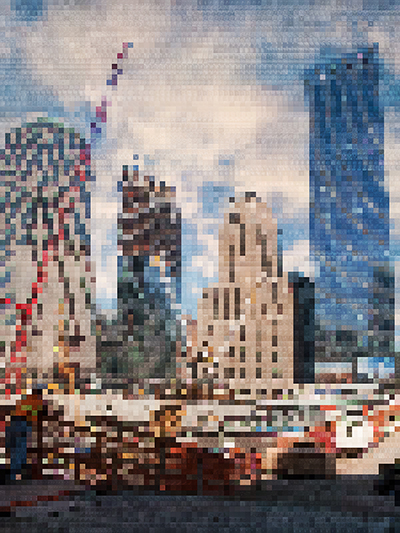25th-28th June 2018
The EKSIG track aims to examine collaboration within design research teams that comprise members with diverse disciplinary expertise. This is to understand how individual experiential knowledge, or knowledge gained by practice, is shared, how collective experiential knowledge is accumulated and communicated in and through collaboration, and how it is embodied in the outputs and may be traced back to the origin of the practice. The track also aims to illuminate making as the action of change in which matter and materials are transformed through collaboration, interaction or negotiation between the collaborative team and their material environment. Making within collaborations occurs in multiple forms, on many levels and in different contexts and, through making, meaning is made, communicated and shared. Learning is a process of change where existing knowledge and experience of a certain topic is reviewed, added or transformed. The track will explore how learning is transferred and articulated within multidisciplinary teams. Starting with an understanding of making and collaborative learning, it will discuss how we can create a greater awareness of our responsibilities as designers, researchers, consumers, teachers and members of society.
We welcome papers which exemplify interdisciplinarity through worked examples, and from researchers and practitioners whose work is centred on the experiential knowledge of collaborative work in interdisciplinary projects. We are interested in building a rich collection of case studies that may contribute to a more systematic approach for studying and integrating experiential knowledge into design practice and research. Submissions should focus on peer-level collaboration, illuminating its usefulness for the partners involved, and highlight the relationships built within the collaboration, as well as the approaches used and the new knowledge gained and transferred within the team.
Abrahamson, D. & Chase, K. (2015). Interfacing Practices: Domain Theory Emerges via Collaborative Reflection. Reflective Practice: International and Multidisciplinary Perspectives, 16(3): 372–389. DOI: 10.1080/14623943.2015.1052384.
Bhömer, M., Tomico, O., Kleinsmann, M., Kuusk, K. & Wensveen, S. (2012). Designing Smart Textile Services Through Value Networks, Team Mental Models and Shared Ownership. In Proceedings of the Third Service Design and Service Innovation Conference (pp. 53–63). Espoo: Laurea University of Applied Sciences.
Bowen, S., Durrant, A., Nissen, B., Bowers, J. & Wright, P. (2016). The Value of Designers’ Creative Practice within Complex Collaborations. Design Studies, 46, 174-198. DOI: 10.1016/j.destud.2016.06.001.
Ingold, T. (2013). Making: Anthropology, Archaeology, Art and Architecture. London: Routledge.
Mikkonen, J. & Pouta, E. (2016). Flexible Wire-Component for Weaving Electronic Textiles. In Proceedings of 2016 IEEE 66th Electronic Components and Technology Conference (pp. 1656–1663). DOI 10.1109/ECTC.2016.180.
Nimkulrat, N. & Matthews, J. (forthcoming 2017). Ways of Being Strands: Cross-Disciplinary Collaboration Using Craft and Mathematics. Design Issues, 33(4).
Rutkowska, J., Lamas, D., Visser, F. S., Wodyk, Z., & Bańka, O. (2017). Shaping Loyalty: Experiences from Design Research Practice. Interactions, 24(3), 60–65.
Submission:
– Your paper will need to be between 5000 and 6000 words (maximum) in length excluding abstract and references using formatting applied in the template (see attached).
– All submissions must be in the English language.
– The online submission system will be open from 5th September 2017 and full papers must be submitted by midnight on 6th November 2017.
Key Dates:
– Submission system opens: 5th September 2017
– Deadline for full papers: 6th November 2017
– Notification of accepted papers: 8th February 2018
– Deadline for full paper revisions: 6th March 2018
– Final acceptance of revised papers: 27th March 2018
– Conference Dates: 25th-28th June 2018
Track Chair: Nithikul Nimkulrat, Estonian Academy of Arts, Estonia
Track Sub-Chairs:
Abigail Durrant, Northumbria University, UK
Camilla Groth, University College of Southeast Norway, Norway
Marte S. Gulliksen, University College of Southeast Norway, Norway
Kristi Kuusk, Estonian Academy of Arts, Estonia
David Lamas, Tallinn University, Estonia
Janette Matthews, Loughborough University, UK
Jussi Mikkonen, Aalto University, Finland
Oscar Tomico, Elisava, Barcelona School of Design and Engineering, Spain and Eindhoven University of Technology, The Netherlands
Stephan Wensveen, Eindhoven University of Technology, The Netherlands

